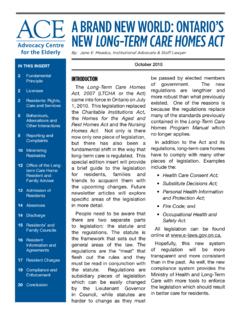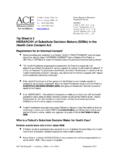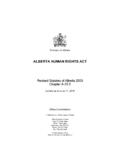Transcription of Every resident: Bill of rights for people in Ontario …
1 EveryresidentBill of rights for people who live in Ontario long-term care homesSeptember 2008 Every resident : bill of rights for people who live in Ontario long-term care homes Advocacy Centre for the Elderly (ACE) and Community Legal Education Ontario (CLEO)ISBN 0-88903-256-4 Edited, designed, and produced by: CLEO (Community Legal Education Ontario / ducation juridique communautaire Ontario )With funding from: Legal Aid Ontario and Department of Justice CanadaIllustrations by: Laurie Wonfor Nolan, Five Seven Nine DesignThe first edition of this publication was written by Susan Chernin, Joan Jenkinson, and Taivi Lobu, with Cathy Paul as clear language consultant. All subsequent editions have been revised by CLEO and the Advocacy Centre for the Elderly (ACE).
2 CLEO has free publications on other legal topics as well. We revise our publications regularly to reflect changes in the law. Our Discard List tells you which publications are out of date and should be thrown a copy of our current Order Form or Discard List, please visit our web site at < > or call 416-408-4420, extension of rights for people who live in Ontario long-term care homesLong-term care homes are places where you can live and receive care services, such as nursing and personal assistance. They are sometimes called long-term care facilities . How this booklet can helpThis booklet can help you understand your rights as a resident of a long-term care home. These rights are yours by rights are set out in the laws of OntarioIn Ontario , there are three types of long-term care homes.
3 Each type of home is regulated by its own law. And each of these laws includes a residents bill of rights : Nursing homes are under the law called the Nursing Homes Act. Municipal homes for the aged are under the law called the Homes for the Aged and Rest Homes Act. Charitable homes for the aged are under the law called the Charitable Institutions Act. The bill of rights for residents of Ontario nursing homes became law in 1987. In 1993, it became law for residents of Ontario municipal and charitable homes for the aged. The Ontario government passed this bill of rights to make sure that long-term care facilities are truly homes for the people who live in them. The bill of rights must be displayedEvery long-term care home must post the bill of rights .
4 It tells staff at the home that they must respect your rights while you live there. It tells them to remember that you are in your bill of rights reminds everyone residents, staff, friends, family, and neighbours that residents of long-term care homes are valued members of the community. Everyresident has the right to be treated with courtesy and respect and in a way that fully recognizes the resident s dignity and individuality, and to be free from mental and physical abuse. In other have the right to be treated with respect. The staff at your long-term care home must be polite to you. They must recognize your dignity and your rights as a person. No one is allowed to abuse you mentally or abuse is when someone humiliates, insults, frightens, threatens, or ignores you, or treats you like a abuse is when someone sexually assaults you, handles you roughly, or slaps, pushes, or beats has the right to be properly sheltered, fed, clothed, groomed, and cared for in a manner consistent with his or her needs.
5 In other have the right to receive proper care. Your special needs should be looked after by the staff at your long-term care care should include:a proper place to live,enough good food to eat,clean clothes to wear, andhelp with looking clean and tidy. 2 Everyresident has the right to be told who is responsible for and who is providing the resident s direct care. In other have the right to know who is looking after people who are responsible for your medical and personal care are:doctors,the director of nursing,registered nurses,registered practical nurses,health care aides,extra staff for nights or weekends, andvolunteers. 3 Everyresident has the right to be afforded privacy in treatment and in caring for his or her personal needs.
6 In other have the right to should feel that you are being treated with respect when you are given medical care. For example, when your doctor is treating you, the privacy screen or curtain around your bed should be should also feel that your privacy is being respected when your personal needs are being looked after. For example, when you take a bath or use the washroom, there should be a door you can close if you want has the right to keep in his or her room and display personal possessions, pictures, and furnishings in keeping with safety requirements and other residents rights . In other have the right to keep personal things in your room. Remember, this is your home. As in any home, it is important to have personal things around you to make you feel comfortable or to remind you of special people and special example, you might have a favourite quilt, cushions, books, or clothes.
7 You might have pictures of your children or grandchildren, or other important pictures. You might also have your own furniture, a lamp, a radio, or a to the staff about what you would like to have in your room. Your personal belongings should not interfere with the safety or rights of other people who live in your long-term care has the right to be informed of his or her medical condition, treatment, and proposed course of treatment. In other have the right to understand your doctor or someone else in charge of your care should tell you:what kind of health care you need,what treatment you are getting, and what treatment is being planned for you. 6aEveryresident has the right to give or refuse consent to treatment, including medication, in accordance with the law, and to be informed of the consequences of giving or refusing consent.
8 In other your doctor suggests a way to help you, you can decide to:do what the doctor says,not take the doctor s advice, ortalk to another doctor or qualified must be told what will happen to you if you agree to have a treatment or take prescribed drugs and what will happen if you do can make your own decisions if you are competent. You are competent if you understand what you are doing and you understand the consequences of your have the right to be involved in decisions about your treatment. You can have someone help you make decisions if you wish. 6bEveryresident has the right to have the opportunity to participate fully in making any decision and obtaining an independent medical opinion concerning any aspect of his or her care, including any decision concerning his or her admission, discharge, or transfer to or from a long-term care facility.
9 In other have the right to talk to someone outside your long-term care home to get a second opinion about the kind of care you have the right to have family, a friend, or an advocate with you when you meet with doctors and nurses. This person can help you decide what to have the right to be involved in any decision that could change where you live, such as a discharge or transfer from your long-term care home. If you do not agree with the decision, you can get a second has the right to have his or her records of personal health confidential in accordance with the law. In other law says your health and medical records are private. Only the people responsible for your care can see these records, unless you give your permission to someone else.
10 Your records must be kept in a place where others cannot see has the right to receive reactivation and assistance towards independence consistent with his or her requirements. In other have the right to get help to become as independent as you have the right to participate in programs at your long-term care home that can help you keep or improve your independence. You could do exercises, play games, make crafts, and take part in other activities that are who is being considered for restraints has the right to be fully informed about the procedures and the consequences of receiving or refusing them. In other have the right to get information about restraints. A restraint is anything that limits your movement. Some examples of restraints are:medication or drugs,wheelchairs with lap belts,mittens so you do not scratch yourself, andbed rails so you do not fall out of should not hurt you or make you you may need a restraint for your safety.










